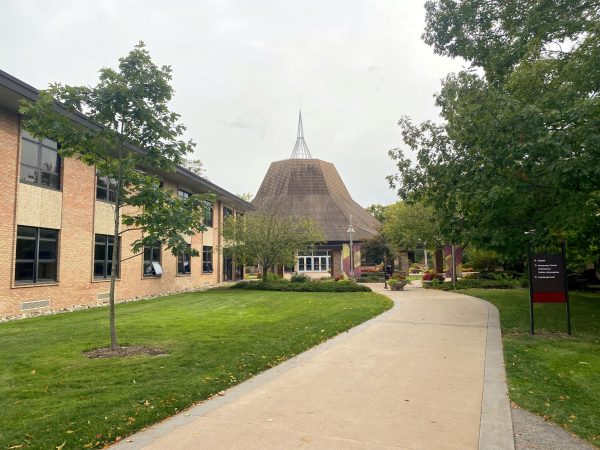Expanding worldwide Church changes future of Christianity
The former General Secretary of the RCA presented 10 factors that are changing how Christians practice faith in the contemporary world. The speaker, Wes Granberg-Michaelson, instructed and challenged people to live out discipleship in different ways as Christianity grows, primarily in non-Western cultures through unexpected ways.
Michaelson spoke at the Meeter Center Lecture Hall on Tuesday, October 9. A handful of students, professors, guests, and Pastor Mary attended.
Michaelson worked as managing editor for Sojourners Magazine and has participated in advancing several church organizations around the world including the Global Christian Forum. He assisted Oregon Senator Mark Hatfield and has authored numerous publications.
He began by stating, “like the conversion of Emperor Constantine, the Schism of 1054, and the Reformation, we are at a hingepoint in Christian History.” He claimed, “The shift of Christianity out of cultures in America and Western Europe to Asia, South America and Africa, is pivotal to our faith.”
According to Michaelson, “Christianity has grown up in Western, enlightened culture, but it is a non-Western religion.” The primarily white, Reformed bubble that folks here in Michigan have known is bursting.
Next, he cited his experience of interacting with congregations across the globe to provide examples for 10 areas in which Christianity is changing and the implications.
First, he explained how American congregations are shrinking, yet Americans consider themselves more religious. He said, “In the next 25 years, up to 30 percent of U.S. congregations are expected to close.” The fact that fewer people chose to identify with religious institutions, yet consider themselves spiritual, shows the desire that congregations want to change. Along this line, Michaelson offered that revitalization of Church communities happens the greatest in multiracial congregations — which are increasing most rapidly.
Michaelson also proposed that Western and non-Western nations view reality through different lenses. He said, “In our culture, we begin by seeing that the individual is primary, whereas in non-Western cultures, community is primary.”
Following this reasoning, Michaelson attested, “More people must say me for the community, rather than the community for me.” Essentially, often in Western culture, Christians search for churches which meet their long list of personal preferences, where the focus instead should be on how they can contribute to a specific congregation.
Michaelson argued that Western Christians must recover the sense that the physical world itself is as sacred as many non-Western Christians vindicate. He added, “Western cultures assume big division between what’s material and what’s spiritual, but non-Western cultures have a much greater relationship in seeing how the two fit together.” This concept must be understood, since “the survival of the sustainability of the earth is under serious threat.”
Lastly, Michaelson convicted Western Christians for exporting Church denominational divisiveness to the rest of the world as an unhelpful way to spread the gospel.
After the talk, there was a Q & A.
The points from Michaelson’s talk come from his book Future Faith: Ten Challenges Reshaping Christianity in the 21st Century. Although the book is aimed at church leaders, Christian readers from any walk of life can benefit from evaluating the areas he highlights with knowledge of the gospel.
Michaelson’s book Future Faith is available from fortresspress.com and Amazon.






